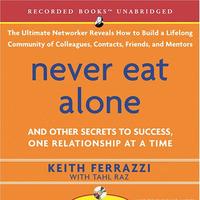12. CHAPTER 2 - Don't Keep Score
By the time our caravan of lost souls made it to D.C, we all had places to stay and we were on our way to getting summer jobs.
I'm pretty sure that Mr. Pidgeon had made a few similar calls for Jim in his day. Mr.
Pidgeon understood the value of introducing people to people, Kiski boy to Kiski boy. He knew not only the impact it would have on our individual lives, but that the loyalty such acts engender would ultimately reap rewards for the nearly bankrupt, small, five-building facility in southwestern Pennsylvania he was trying to establish.
And so it has.
Jim and I are now on the Board of Directors at our alma mater. And if you were around when Jack first took over the school, today you'd barely recognize the place, with its ski slopes, golf course, fine arts center, and the sort of sophisticated technology that makes it look like some midwestern MIT. My point is this: Relationships are solidified by trust.
Institutions are built on it. You gain trust by asking not what people can do for you, to paraphrase an earlier Kennedy, but what you can do for others.
In other words, the currency of real networking is not greed but generosity.
When I look back on all the people who have taught me invaluable lessons about creating lasting relationships—my father, Elsie, my mentees and the college kids I speak with, Ray, Mr. Pidgeon, the people I've worked with—I come away with several fundamental insights and observations: 1.
Yesterday we had the new economy. Today we have the old economy (again! ), and no one can predict what's going to be thrown at us next. Business cycles ebb and flow; your friends and trusted associates remain. A day might well come when you step into your boss's office some afternoon to hear, "I'm sorry to have to tell you this, but..." Tough day, guaranteed. The experience will be a whole lot easier to handle, however, if you can make a few calls and walk into someone's office soon after to hear, "I've been waiting for this day to come for a long time. Congratulations ..." Job security?
Experience will not save you in hard times, nor will hard work or talent. If you need a job, money, advice, help, hope, or a means to make a sale, there's only one surefire, fail-safe place to find them—within your extended circle of friends and associates. 2.
There's no need to ponder whether it's their lunch or yours. There's no point in keeping track of favors done and owed. Who cares?
Would it surprise you if I told you "Hollywood" David isn't doing that well any longer? David hoarded the relational equity he had until he eventually looked around and discovered there was nothing more to hoard. Ten years after I met him at that Santa Monica cafe, I haven't heard from him. In fact, no one else I know has heard from him either. Like so many industries, entertainment is a small world.
Bottom line: It's better to give before you receive. And never keep score. If your interactions are ruled by generosity, your rewards will follow suit.
3.
The business world is a fluid, competitive landscape; yesterday's assistant is today's influence peddler. Many of the young men and women who used to answer my phones now thankfully take my calls. Remember, it's easier to get ahead in the world when those below you are happy to help you get ahead, rather than hoping for your downfall. Each of us is now a brand.
Gone are the days where your value as an employee was linked to your loyalty and seniority. Companies use branding to develop strong, enduring relationships with customers. In today's fluid economy, you must do the same with your network. I would argue that your relationships with others are your finest, most credible expression of who you are and what you have to offer.
Nothing else compares.
4.
Contribute. It's like Miracle-Gro for networks. Give your time, money, and expertise to your growing community of friends.
5.
In thinking about what Jack Pidgeon did for me and countless others, and the legacy he will leave behind because of it, I've become more convinced than ever that sharing what I've learned from him about reaching out to others is the greatest way to repay my former headmaster. Thanks again, Mr. Pidgeon.

